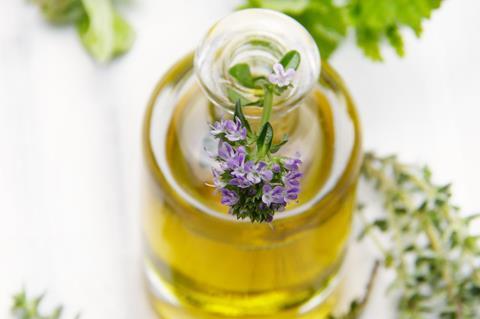Thyme essential oil shows efficacy in inhibiting the biofilm formation of Staphylococcus aureus at a concentration of 0.03% (v/v), a new study being presented at Letters in Applied Microbiology ECS Research Symposium has revealed.

Sofia Ashworth-Endicott of the University of the West of England made the discovery during her undergraduate dissertation, overseen by Prof. Emmanuel Adukwu.
Her research, entitled ‘The Anti-Biofilm Activity of Thymus vulgaris Essential Oil Against Staphylococcus aureus and Pseudomonas aeruginosa’ has been accepted for the symposium this May.
Antimicrobial alternatives
“Antimicrobial resistance is forecast to cause 10 million deaths per annum by 2050, and there is an increasing need for antimicrobial alternatives in addressing this issue,” she said.
“Biofilms play a role in increasing the resistance of bacteria to conventional antimicrobials. Staphylococcus aureus and Pseudomonas aeruginosa are major contributors to biofilm-associated infections. This project set out to determine the antimicrobial and anti-biofilm potential of Thymus vulgaris essential oil.”
Sofia established biofilm formation through Congo red agar assay, using a method adapted from Kaiser et al, 2013 and a crystal violet microplate method adapted from Stepanovic et al, 1999. Both microorganisms displayed biofilm formation.
Determining susceptibility
Susceptibility to known antimicrobials and the essential oil was determined through disc and vapour diffusion assays, the methods adapted from Prabuseenivasan et al (2006) and Mollea et al (2022). Both microorganisms showed susceptibility to the essential oil through direct contact, whereas the volatile compounds were only antimicrobials effective against Staphylococcus aureus.
Biofilm inhibitory concentration was determined through a microplate method adapted from Adukwu et al, 2012. Biofilms were stained using crystal violet solution and optical density read at 595 nm.
“I found that biofilm formation of Staphylococcus aureus was inhibited by 0.03% thyme essential oil, which was the lowest concentration tested. On the other hand, biofilm formation of Pseudomonas aeruginosa was not inhibited at any concentration tested (0.03-4%),” Sofia said.
Surprising efficacy
“The efficacy of volatile essential oil treatment against Staphylococcus aureus was surprising to me. This offers exciting potential in which thyme essential oil could be employed in its volatile form for the treatment of infections.
“The result from this research offers promising insight to the potential of thyme essential oil as an antimicrobial treatment for Staphylococcus aureus biofilm-associated infections. The findings carry significant implications across multiple fields where biofilm formation causes significant problems - for example the anti-biofilm properties of thyme essential oil could be leveraged in wound care products, catheter coatings and hospital disinfection protocols.
”While the research carried out in this project looked at the anti-biofilm properties of thyme essential oil in vitro and provided valuable preliminary data, it may not be fully representative of the complex microbial interaction and environmental conditions in vivo,” Sofia said.
Next steps
“Further research should investigate the effects in vitro, with consideration of potential cytotoxicity and adverse effects on human cells, as well as the biocompatibility of the essential oil with biological fluids and environmental substrates,” she added.
This research was led by Prof. Emmanuel Adukwu at the University of the West of England. The project was supported by Oluwadamilola Okeyoyin, Jisa Salim, and Vikas Nariapara, as well as undergraduate peers within Prof. Emmanuel Adukwu’s research group.
The Letters in Applied Microbiology Early Career Scientist Research Symposium will be held at University of the West of England (UWE) in Bristol, UK, on 15 May 2024. To find out more, visit the event page.
Topics
- Antimicrobial Resistance
- Antimicrobials
- Applied Microbiology International
- Bacteria
- Biofilms
- Community
- Early Career Research
- Emmanuel Adukwu
- Infection Prevention & Control
- Jisa Salim
- Oluwadamilola Okeyoyin
- One Health
- Pseudomonas aeruginosa
- Research News
- Sofia Ashworth-Endicott
- Staphylococcus aureus
- thyme essential oil
- Thymus vulgaris
- UK & Rest of Europe
- University of the West of England
- Vikas Nariapara







No comments yet